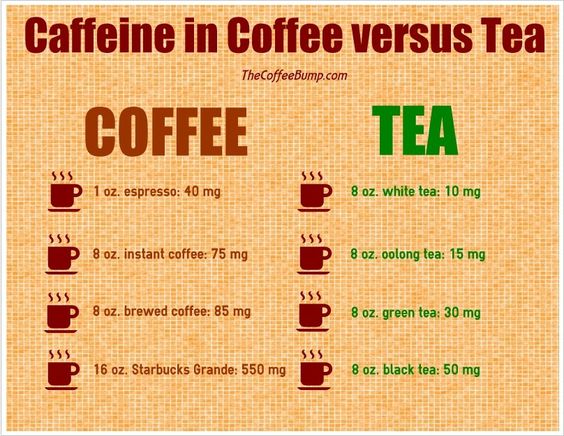Tea and Caffeine

Source Tea Advisory Panel
What is caffeine?
People have enjoyed caffeinated beverages for many years. The earliest record of caffeine consumption dates back to at least 2700 B.C., when Chinese Emperor Shen Nung drank hot brewed tea.
Caffeine is a naturally occurring substance found in the leaves, seeds or fruits of at least 100 different species worldwide and is part of a group of compounds known as methylxanthines. The most commonly known sources of caffeine are coffee, cocoa beans, cola nuts and tea leaves. Caffeine is also added to specifically formulated ‘energy drinks’ and pharmaceutical products such as cold and flu remedies.
Coffee and tea also contain other dimethylxanthines; theophylline which has similar properties to caffeine and theobromine whose pharmacological actions is far less potent than caffeine and theophylline.
The amount of caffeine present in products depends on the type of the product, the serving size and the preparation method. Caffeine levels of tea as consumed in the UK have been determined in a recent survey conducted for the FSA Food Surveillance Unit.[1] In this survey caffeine in a serving of tea, as brewed by adults in the UK, was found to be typically 33mg in a 190ml cup. This compares to an earlier estimate of 50mg per cup, which was based on laboratory-prepared beverages.[2] Table 1 gives an indication of the amount of caffeine found in other drinks and food compared to tea:
What is caffeine?
People have enjoyed caffeinated beverages for many years. The earliest record of caffeine consumption dates back to at least 2700 B.C., when Chinese Emperor Shen Nung drank hot brewed tea.
Caffeine is a naturally occurring substance found in the leaves, seeds or fruits of at least 100 different species worldwide and is part of a group of compounds known as methylxanthines. The most commonly known sources of caffeine are coffee, cocoa beans, cola nuts and tea leaves. Caffeine is also added to specifically formulated ‘energy drinks’ and pharmaceutical products such as cold and flu remedies.
Coffee and tea also contain other dimethylxanthines; theophylline which has similar properties to caffeine and theobromine whose pharmacological actions is far less potent than caffeine and theophylline.
The amount of caffeine present in products depends on the type of the product, the serving size and the preparation method. Caffeine levels of tea as consumed in the UK have been determined in a recent survey conducted for the FSA Food Surveillance Unit.[1] In this survey caffeine in a serving of tea, as brewed by adults in the UK, was found to be typically 33mg in a 190ml cup. This compares to an earlier estimate of 50mg per cup, which was based on laboratory-prepared beverages.[2] Table 1 gives an indication of the amount of caffeine found in other drinks and food compared to tea:
Table 1: CAFFEINE CONTENTS OF COMMONLY CONSUMED FOODSTUFFS
|
FOODSTUFF
|
TYPICAL CAFFEINE CONTENT mg/serving |
|
Instant Coffee
|
75 mg/190 ml cup 45mg/190ml* |
|
Brewed Coffee (Filter or Percolated) |
100 – 115 mg per 190 ml cup 111mg per 190ml cup* |
|
Decaffeinated Coffee (Brewed or Instant) |
4 mg per 190 ml cup |
|
Tea
|
50 mg per 190 ml cup 33 mg per 190ml* |
|
Drinking Chocolate
|
1.1 – 8.2 mg per 200 ml cup (when made up as per manufacturer’s instructions) |
|
COLA (Regular & Diet) |
11 – 70 mg per 330 ml can |
|
Energy Drinks (With added caffeine and/or guarana) |
28– 87 mg per 250 ml can
|
|
Chocolate |
5.5 – 35.5 mg per 50g bar |
Source: MAFF Food Surveillance Information Sheet 144, March 1998,2 except values marked with * which are from FSA Survey of Caffeine Levels in Hot Bevrages, Food Information Sheet 53/04 April 20041.
On average we consume 3.98mg of caffeine /kg body weight per day ie 239mg/ day for a 60kg person.[3]
What is a safe intake of caffeine?
Up to 300mg/day (6 cups of tea) is considered moderate, with no evidence of harmful effects in the vast majority of the adult population. Some individuals are sensitive to caffeine and will feel effects at smaller doses than do individuals who are less sensitive. For this reason, these individuals may need to limit their caffeine intake.
Metabolism and clearance
Caffeine does not accumulate in the body over the course of time and is normally excreted within several hours of consumption. The rate of caffeine elimination varies between individuals and this maybe as a result of genetic factors affecting the enzymes involved in the metabolism, or due to certain lifestyle factors eg smoking. Children also metabolise caffeine at a quicker rate. Generally caffeine absorption is complete within about one hour after ingestion and the plasma concentration peaks after about 60-90 minutes. The half-life of caffeine in the plasma is about 2.5 – 4.5 hours in healthy adults.[4]
Caffeine tolerance
A number of different factors affect individual tolerance to caffeine, including the amount ingested,[5] the frequency of caffeine consumption and individual metabolism. It is well recognised that gradual tolerance develops with prolonged caffeine use.[6],[7],[8],[9],[10]
Physiological effects
Caffeine is a pharmacologically active substance, and depending on the dose, has a number of actions:-
- Central Nervous System Stimulant. A moderate caffeine intake can cause mild stimulation that maybe beneficial in terms of increased alertness, concentration, improved performance and decreased fatigue.[11],[12],[13],[14],[15],[16],[17],[18], While a number of these studies have found improvements after a single dose of caffeine, a double blind, placebo controlled trial found that this effect was also observed after consuming caffeine in a more realistic regime, typical of every day drinking habits.[19] However, higher intakes may affect sleep, cause nervousness and an irregular heartbeat.
- Weak Bronchodilator. As a result, interest has been shown in its potential role as an asthma treatment. A number of studies have explored the effects of caffeine in asthma and the conclusions from a Cochrane Review suggest that caffeine appears to improve airways function modestly in people with asthma for up to four hours after consumption.[20]
- The diuretic action of caffeine may be due to an increase in renal blood flow, leading to an increased glomerular filtration rate (GFR), or due to a decreased reabsorption of sodium in the renal tubules. The diuretic effect of caffeine is dependent on the amount consumed and duration of intake e.g. the caffeine in tea does not have a diuretic effect unless the amount of tea consumed at one sitting contains more than 250-300mg of caffeine, equivalent to between 5 and 6 cups of tea.[21]
Due to the volume of fluid that is drunk whilst enjoying a cup of tea, the Food Standards Agency and the British Dietetic Association both advise that tea can help towards meeting daily fluid requirements.
- Cardiac Muscle Stimulant. Moderate caffeine consumption does not increase cardiac arrhythmias.[22],[23]
If regular caffeine consumption is stopped abruptly, symptoms such as headaches, irritability and fatigue may occur. These effects are usually temporary, disappearing after a day or so and can be avoided if caffeine cessation is gradual.
Caffeine and Health
The role of caffeine in the development of certain diseases and conditions has been the subject of extensive research in recent years.
- Cancer
A number of studies investigating the impact of caffeine in the development of cancer have consistently failed to establish a relationship.[24] In fact, tea is one of the richest sources of flavonoids, a powerful group of antioxidants. The role of antioxidants in the prevention of free radical damage has led to suggestions that tea maybe anti-carcinogenic.[25] For more information on this subject please refer to the fact sheet ‘Tea and Cancer.’
- Heart Disease.
A number of studies have investigated the relationship between caffeine and heart disease. A review of the available data on caffeine and health concluded that ≤ 400mg caffeine/ day does not adversely affect cardiovascular health.24 Furthermore it has been suggested that the beneficial effects of the flavonoids present in tea may offset any potential adverse effects of caffeine.[26] The Committee on Medical Aspects of Food Policy concluded that ‘there is little evidence that caffeine itself has any relation with CHD risk’ in the 1994 Nutritional Aspects of Cardiovascular Disease report.[27]
- Parkinson’s Disease.
Observational studies have suggested that caffeine may play a role in protecting against Parkinson’s disease,[28],[29]although further research is required to confirm this.
- Relief of headaches.
In a study of 301 regular headache sufferers, researchers found that a combination of ibuprofen and caffeine was better than either drug alone in relieving pain.[30] Although a caffeine ‘pill’ was used in this trial, the researchers believed that caffeinated beverages would work just as well. However, they did warn that chronic headache sufferers should avoid caffeine because it might exacerbate symptoms. More work is required in this field before firm conclusions about caffeine and pain relief can be drawn.
- Pregnancy
Caffeine crosses the placenta and achieves blood and tissue concentrations in the foetus that are similar to maternal concentrations. For this reason advice published by the Food Standards Agency[31] recommends that pregnant women should limit their intake of caffeine consumption to less than 300mg/ day (equivalent to 6 cups of tea/ day). At this level there is little evidence to suggest that the health of the unborn child or mother is affected.
- Bone and Calcium Balance
The data to suggest that caffeine potentially adversely influences bone metabolism includes epidemiological studies investigating the relationship between caffeine and the risk of osteoporosis (as characterised by low bone mineral density) and increased susceptibility to fractures, as well as metabolic studies examining the effect of caffeine on calcium homeostasis.
The results of these studies are inconsistent. This is because interpretation of caffeine’s effect on bone metabolism is complicated by other risk factors such as calcium intake, age, cigarette smoking and alcohol intake that need to be accounted for.
Reviewing the evidence to date Nawrot et al suggest that the significance of caffeine’s potential to adversely affect calcium balance and bone metabolism is dependent on lifetime caffeine and calcium intakes and is biologically more relevant in women. He concludes by saying that the current data indicates that caffeine intakes of <400mg/ day do not have significant effects on bone status or calcium balance in individuals ingesting at least 800mg of calcium a day.24
In summary…
Despite recent publicity about caffeine, the fact remains that the consumption of caffeine at intakes of 300mg/ day has no adverse effects in the vast majority of the adult population. For this reason an average intake of four cups of tea a day is well within the level considered safe.
References:
[1] FSA, Survey of caffeine levels in hot beverages. 2004, FSA Surveillance Unit.
[2] Ministry of Agriculture, Fisheries and Food (MAFF) (1998). Survey of caffeine and other methylxanthines in energy drinks and other caffeine containing products (updated). Food Surveillance Information Sheet No. 144 (No. 103 revised). London
[3] Barone JJ, et al. (1996) Caffeine consumption. Food and Chemical Toxicology 34; 119-129
[4] Graham TE (1997) The possible actions of methylxanthines on various tissues. In Reily T., Orme M (eds). The clinical pharmacology of sports and exercise. Elsevier Science, Amsterdam. 257-270
[5] Passmore AP, et al (1987) Renal and cardiovascular effects of caffeine: a dose-response study. Clin Sci (London) 72; 749-756
[6] Colton T, et al (1968) The tolerance of coffee drinkers to caffeine. Clin Pharmacol Ther 9; 31-39
[7] Denaro C, et al (1991) Effects of caffeine with repeated dosing. Eur J Clin Pharmacol 40; 273-278
[8] Goldstein A, et al (1969) Psychotropic effects of caffeine in man. IV. Quantitative and qualitative differences associated with habituation to coffee. Clin Pharmacol Ther 10; 489-497
[9] Myers M, Reeves R (1991) The effect of caffeine on daytime ambulatory blood pressure. Am J Hypertens 4; 427-431
[10] Robertson D, et al (1981) Tolerance to the humoral and hemodynamic effects of caffeine in man. J Clin Invest 67; 1111-1117
[11] Norager CB, et al (2005) Caffeine improves endurance in 75-yr-old citizens: a randomized, double-blind, placebo-controlled, crossover study J Appl Physiol 99; 2302-6
[12] Haskell CF, et al (2005) Cognitive and mood improvements of caffeine in habitual consumers and habitual non-consumers of caffeine. Psychopharmacology (Berl) 179; 813-25
[13] Lieberman HR, et al (1987). The effects of low doses of caffeine on human performance and mood. Psychopharmacology 93; 308-312
[14] Jarvis M. (1993). Does caffeine intake enhance absolute levels of cognitive performance? Psychopharmacology 110; 45-52
[15] Hindmarch I, et al. (1998). The effects of black tea and other beverages on aspects of cognition and psychomotor performance. Psychopharmacology 139; 230-238
[16] Smith AP, et al (1990-91). Effects of caffeine given before and after lunch on sustained attention. Neuropsychobiology 23; 160-163
[17] Durlach PJ, et al (1998). The effects of a low dose of caffeine on cognitive performance. Psychopharmacology 140; 116-119
[18] Battig K. (1986) Effect of coffee on the speed of subject-paced information processing. Neuropsychobiology 16;126-30
[19] Brice CF, Smith AP (2002) Effects of caffeine on mood and performance: a study of realistic consumption Psychopharmaclogy 164; 188-92.
[20] Bara AI, Barley EA. (2001) Caffeine for asthma (Cochrane Review). In: The Cochrane Library, 2, Oxford
[21] Maughan, R. J. & Griffin, J. (2003) Caffeine ingestion and fluid balance: a review. Journal of Human Nutrition & Dietetics 16; 411-420.
[22] Myers MG. (1991) Caffeine and cardiac arrhythmias. Annals of Int Med,114; 147-150
[23] Caron, M. F., Song, J., Ammar, R., Kluger, J. & White, C. M. (2001) An evaluation of the change in electrocardiographic P-wave variables after acute caffeine ingestion in normal volunteers. Journal of Clinical Pharmacy & Therapeutics 26; 145-148.
[24] Nawrot P, et al (2003) Effects of caffeine on human health. Food Add Contam 1; 1-30
[25] Yang C. S., Maliakal P., Meng X. (2002) Inhibition of carcinogenesis by tea. Annu. Rev. Pharmacol. Toxicol. 42; 25-54
[26] Thelle DS (1995) Coffee, tea and Coronary Heart Disease. Current Opin Lipid 6; 25-27
[27] Nutritional Aspects of Cardiovascular Disease (1994). Report of the Cardiovascular Review Group Committee on Medical Aspects of Food Policy. Department of Health
[28] Ross G et al (2000). Association of coffee and caffeine intake with the risk of Parkinson Disease. JAMA, 283; 2674-2679
[29] Ascherio A, et al (2001). Prospective study of caffeine consumption and risk of Parkinson’s disease in men and women. Ann Neurol, 50; 56-63
[30] Diamond S, et al (2000). The Use of Ibuprofen Plus Caffeine to Treat Tension-type Headache. Clinical Pharmacology and Therapeutics 68; 312-31
[31] Food Standards Agency (2001). Committee on Toxicity of Chemicals in Food, Consumer Products and the Environment. Statement on the Reproductive Effects of Caffeine



